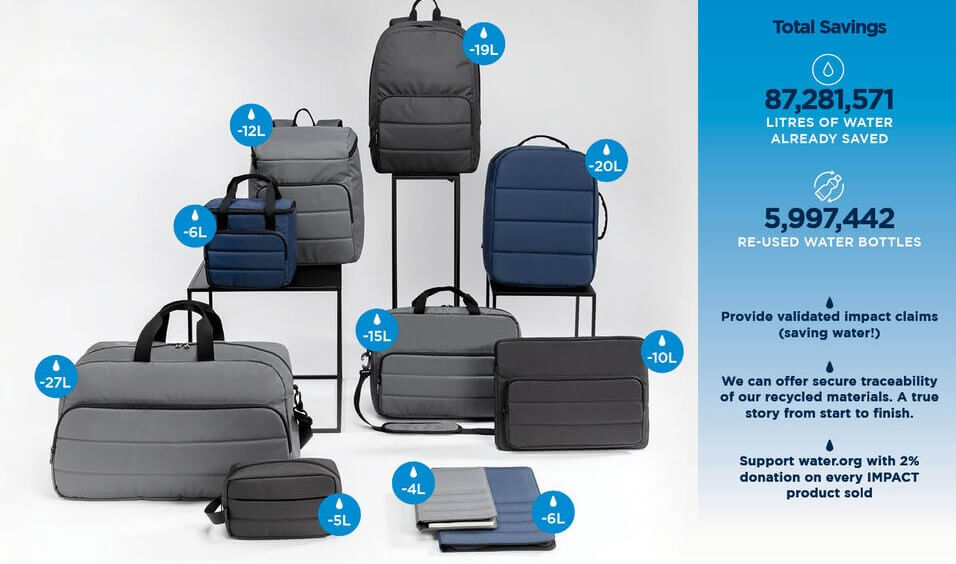5 Sustainability trends your business needs to adopt in 2025

Want to be more sustainable in 2025?
Are you recycling all your office waste? Do you work in an eco-building? Are you saving as much water as you possibly can?
Improving your sustainability metrics as a brand is a hot topic right now - and rightly so. With the 2015 Paris Agreement deadline fast approaching, your business needs to keep up with the latest corporate sustainability trends to future-proof yourself - before time runs out.
Having a sustainability agenda isn’t just nice to have anymore - it’s a must.
And with 81% of brands globally now using sustainability metrics in their overall strategic ideation, it's high time we made that 100% - don’t you think?
Keep reading for the latest sustainability trends in business for 2025.
Pssst, we’ve got one super easy way you can be more sustainable in 2025. Check out our range of sustainable promotional products to make a real feel-good impact with your brand today.
5 Sustainability trends your business needs to adopt in 2025
1. Circular economy models
We’ve spoken about products with circular designs before ( products that are reusable and 100% recyclable), but, did you know, your brand could be circular, too?
Circular economy models (extending the longevity of your brand and making it as waste-free as possible), are predicted to grow to $2,882bn by 2031. By championing the cornerstones of a circular economy (repair, reuse, recycle), businesses are future-proofing their strategies to meet the demands of greener businesses by consumers.
Leading the way in this are brands such as Patagonia with their The Worn Wear programme and IKEA with their take-back programme, circular services and investment in sustainable materials are leading the way.
Ensuring the product or service you offer is ‘circular’ in its creation and destruction is pivotal for making as little impact as possible environmentally while making a lasting positive impression of your brand.
To start, you need to redefine what ‘waste’ is within your business model.
Circular design champions sourcing materials and resources that are close to home, and that have the least environmental impact possible.
Why not try…
Read more: What is circular design?%20(1)-1.webp?width=600&height=317&name=Blog%20Header%20(4)%20(1)-1.webp)
2. Net Zero commitments, decarbonisation & renewable energy
If you haven’t already, it’s probably time you made 2025 all about your brand’s Net Zero commitments. If you’re already committed, why not make sourcing renewable energy and decarbonisation solutions key pillars of your 2025 business plan?
Our dependency on fossil fuels is massively outdated, with so many alternatives available, it’s time to say goodbye to fossil fuels.
More than ever, companies are committing to 100% renewable energy. It’s all about energy efficiency, fuel switching, and low-emission technologies. Investments in cleantech and infrastructure hit US$2tn in 2024, roughly double the investment in fossil fuels.
In the UK, a new Net Zero Building Standard has been launched, where construction is being held accountable for Net Zero qualifications through concrete metrics (pun very much intended).
With the 2050 Net Zero deadline set by the 2015 Paris Agreement fast approaching, this isn’t something your brand should leave to the last minute to implement.
And why is this so important? It’s not just for business benefits (there will most likely be costs in the future for those who haven’t met carbon neutrality goals by 2050). It benefits all of us as global citizens, our communities, our biodiversity, and the future of our planet.
And you don’t even have to make big changes to make a difference. Why not look into electric vehicle schemes for your team, or try and make your office as green as possible?
It’s not just about the stats. It’s not about the spreadsheets. It’s about the real results. This is how companies will excel in 2025 and derive real value from their carbon initiatives.
"The future of decarbonisation lies in innovative energy management services and strategic renewable energy purchases.”
Anne-Katrin Hagel, Director of Sustainability Solutions at ENGIE Impact.
Read more: Are you a Carbon Net Zero hero?.webp?width=600&height=317&name=blog%20headers%202023%20(4).webp)
3. Enhanced sustainability reporting
Saying you’re sustainable and green is one thing, proving it is another (boo, greenwashing!).
That’s why 2025 will all be about enhanced sustainability reporting. Companies will opt to use more automated reporting tools to streamline their reporting processes.
It’ll soon become commonplace that all large companies and SMEs will be expected to provide enhanced sustainability reporting across the whole of the EU and Europe.
From deep dives into your supply chains, your product’s sustainability features and end-of-life potential, it’ll be all about transparent data in 2025, with penalties for greenwashing for those that don’t meet the high standards expected.
Why not try…
Embracing AI
Does the idea of superior reporting seem daunting to you? Don’t fret - there’s AI that could do it for you.
Loads of companies are already using AI to track things like their carbon footprint, but in 2025, brands will be embracing AI to help enhance their sustainability.
For one thing, you can say goodbye to manual spreadsheets! Goodbye to late-night data checking and recording. Goodbye to stressing over any last-minute mistakes.
AI can process a tonne of data in an instant, allowing companies to analyse their impact on the environment like never before. This also means they can pinpoint exactly where they need to improve a lot faster, making a brand’s sustainability efforts not only more efficient but ultimately, better for the planet, too.
Building designs can be improved to make them more eco-friendly, supply chains can be made more efficient, product development processes can be amended to use less energy and carbon, and energy usage can be tracked in real-time. And that’s just a few examples of how embracing AI in 2025 can help your business meet its sustainability goals..png?width=600&height=317&name=Blog%20Headers%202024%20(11).png)
But, as with anything, there are always pros and cons to new tech. AI isn’t always the most environmentally friendly solution, with massive data centres and insane amounts of electronic waste, so always try and see if there are alternative methods to solve your problem first.
Embracing the AI trend in 2025 with sustainability in mind will be all about stepping away from static data and using fluid (couldn’t resist!), accurate, real-time data for actionable, meaningful change responsibly.
“Artificial intelligence is no longer a futuristic fantasy; it’s rapidly becoming the engine driving efficiency and innovation in transportation technology.”
Christopher Keating, Senior Vice President of Trimble Transportation Europe.
5. Water conservation
Here’s something we should all be striving for in 2025, in both a personal and professional capacity. Water conversation is high up on the agenda for brands to take seriously in 2025 because unfortunately, water is a BIG issue.
In some places, it’s everywhere (especially in the UK - umbrella, anyone?), which can cause havoc with infrastructure and agriculture if those communities aren’t prepared. But there’s not a lot you can do when it comes to flash flooding and tidal surges. Annually, floods cause approximately $5.25bn in damage.
But it’s not just too much water that causes issues, too little does, too. It’s thought that 1.8 billion (yes, billion) people are going to struggle with water scarcity in the coming years, with two-thirds of the global population dealing with water issues. Already, every year, droughts cost $9.4bn in losses.
However, not all hope is lost, and there’s still time for brands to make an impact with water conservation initiatives. From water stewardship, water security and monitoring real-time water usage data (water-utility-monitoring software solutions are forecast to grow to $5.1bn by 2030), commitment to water conservation is more important now than ever before.
Why not try…
Read more: The Big Blue: Blue Health, Blue Carbon and Products made from Ocean-bound plastics

2025’s solution to sustainable merchandise
That’s us!
Your merchandise says a lot about your brand - so make sure it’s something worth saying.
At Fluid, we deliver consistently high-quality sustainable promotional merchandise that helps make each moment meaningful, for you and the planet.
If you’re looking for more inspiration to make a real feel-good impact with your brand, check out our range of sustainable promotional products.
Helping people and the planet with your merch has never been so easy!










